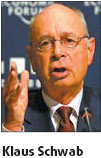New champions meet in Dalian
Updated: 2007-09-06 06:34
Professor Klaus Schwab, founder and executive chairman of the World Economic Forum, has been involved in exchanges with China since 1979 and now he is bringing the Inaugural Annual Meeting of the New Champions to Dalian, a beautiful coastal city in Northeast China. Ahead of the opening of the meeting, Professor Schwab talks about the significance of the meeting in Dalian and global champions.
Q: Why did the World Economic Forum decide to hold the Summer Davos in Dalian as well as its annual meeting in Davos in the winter?

A: This year the World Economic Forum's Annual Meeting in Davos, Switzerland was entitled "The Shifting Power Equation" which had, as one of its main focuses, the changing business landscape.
There was a recognition among the participants that a new class of leaders and innovators have emerged who are reshaping business and transforming society.
We wanted to provide these "New Champions" - the Community of Global Growth Companies (GGCs) - with a powerful platform to interact with the current global leaders.
Dalian was chosen to host this Inaugural Annual Meeting of the New Champions as both Dalian and China continue to demonstrate the dynamism and potential of growth.
The World Economic Forum also wishes to build on our 28 years of partnership with the Chinese government and industry, which has significantly contributed to ongoing development and reform of China, as well as to its integration into the global economy.
Q: Why does the World Economic Forum want to focus on the new champions and young global leaders in Dalian?
A: The World Economic Forum is committed to improving the state of the world.
To achieve this goal we seek to act as a catalyst for global change - a result of the shifting power equation - where new economies are becoming prominent and where individuals and small groups have increasing opportunities to develop and overtake incumbents.
GGCs and Young Global Leaders have the greatest potential to harness innovation and entrepreneurship in new ways.
Q: What are the challenges facing Global Growth Companies?
A: Global Growth Companies face a number of challenges: building brands; managing regulatory risks as they enter new markets; securing financing for growth; and plotting a strategic course through a complex global environment. Leaders of GGCs can best address by combining learning from peers, who face similar challenges, with learning from global experts and industry veterans who can provide the perspective of experience. Throughout this, leaders also must remain focused on the long-term sustainability of their company and their broader contribution to society.
Q: How do you see the emergence of Chinese companies as global champions? How can they succeed?
A: The World Economic Forum has a long and successful history of engagement with China. We are proud of having contributed to China's integration into the global system and we welcome the entrance of the new Chinese companies.
Competition in China can be particularly fierce and this brings significant advantages when entering new markets or competing on price.
At the same time, long-term success will require innovation and responsibility. The innovation will be necessary to stand out from the competitors and responsibility will contribute to building trust with consumers.
Q: How does the forum make sure that the quality of the meeting in Dalian will be the same as the annual meeting in Davos?
A: Dalian has the same intellectual framework as Davos, which is the original pillar of the World Economic Forum. Dalian is the second pillar of the forum, which is a unique multi-stakeholder organization. In putting the Dalian summit together, we have assembled a veteran team of our most experienced staff.
You might think that this is the team doing all of the work, but the real contribution is made by our partners, members and experts. This allows us to tap the best ideas and contributions from around the world, magnifying the contribution of the forum and drawing on this remarkable community committed to improving the state of the world.
Q: The forum has a 37-year history in terms of organizing this kind of event. Does the forum see itself as a mature or emerging champion?
A: Within the forum, we have always sought to be at the forefront of change - in terms of our organization, in terms of how we work, and in terms of helping our stakeholders to come to terms with that change. Innovation and creativity have to be embedded in the DNA of successful organizations whether it be an international organization like the forum or a global corporation. In this regard, I would have to say that we are a hybrid organization - we have the experience and recognition of being an established champion, integrated with the innovation and energy of an emerging champion.
This hybrid culture is critical in our ability to bring together both established and emerging champions. We provide the platform where leaders of these companies can learn from each other, learn from their non-business peers and also collectively contribute to improving society.
In recent years for example the forum was one of the first organizations to introduce webcasting then podcasting, blogging and various Web 2.0 innovations.
The World Economic Forum never stops trying to keep abreast of these changes - indeed, we are working now on a new Web-based networking platform called WELCOM that will create a unique online community which functions as an advanced collaborative platform for 10,000 of the world's top leaders.
It will provide a unique global governance tool to address the challenges our globally interconnected, fast-paced world.
It will offer business, government and intellectual leaders a powerful resource to shape the global regional and industry agenda. It's just the latest milestone in the forum's history of embracing technological innovation that furthers our mission of improving the state of the world.
(China Daily 09/06/2007 page1)
|
|
|
||
|
||
|
|
|
|